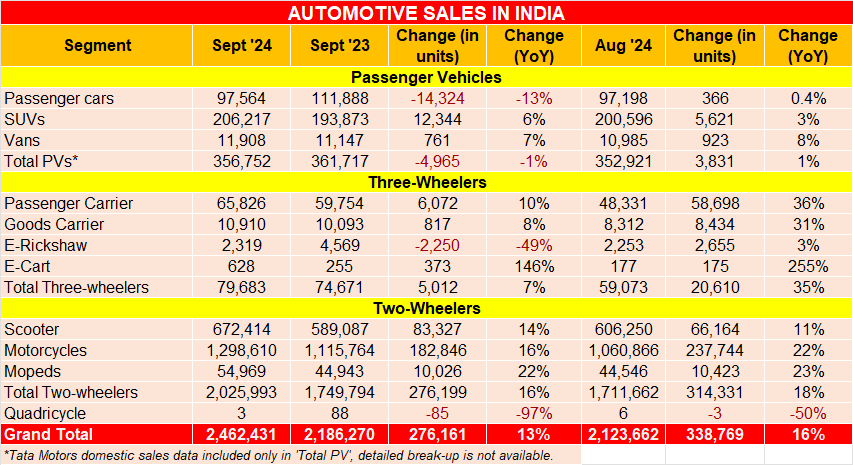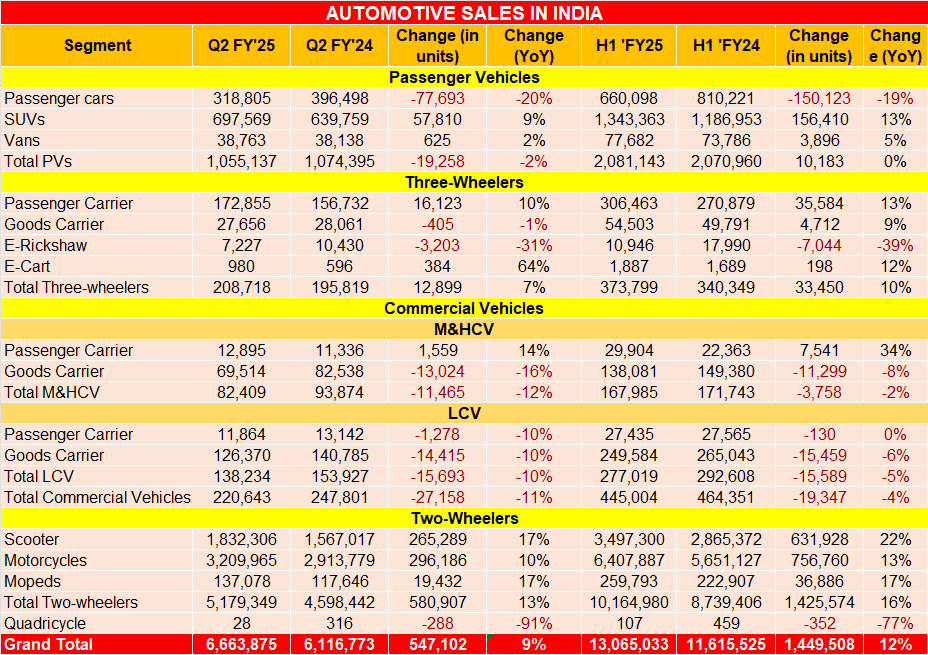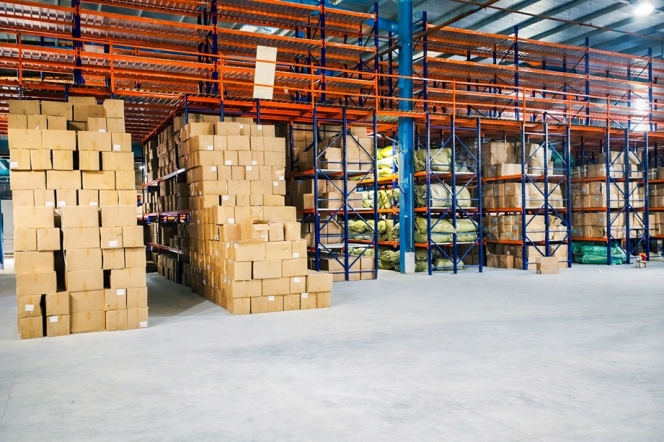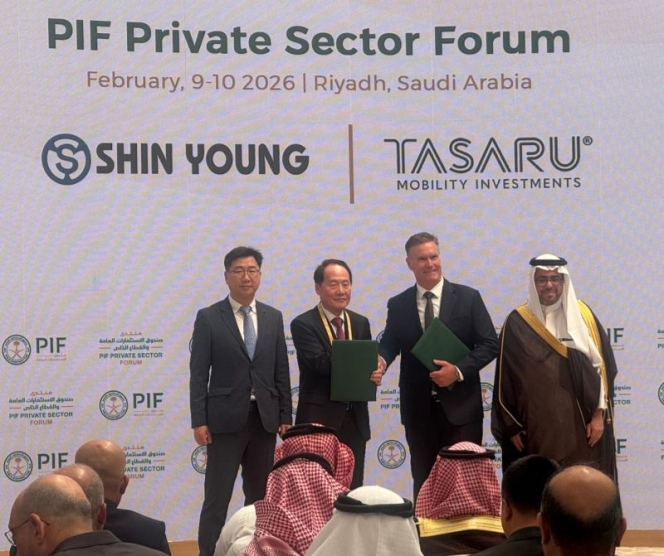- Society of Indian Automobile Manufacturers
- SIAM
- Shailesh Chandra
- Rajesh Menon
- auto wholesales
- sales
- car sales
- bike sales
- scooter sales
- truck sales
- bus sales
- three-wheeler sales
- SUVs
- passenger cars
PVs, CVs wholesales in the red for Q2 FY2025, 2Ws and 3Ws power overall growth
- By MT Bureau
- October 14, 2024

The automotive wholesales numbers for September 2024 and Q2 FY2025 are out, seeing mixed results.
As per the latest data released by the Society of Indian Automobile Manufacturers (SIAM), the apex body representing automakers in India, for September 2024, the passenger vehicle segment sold 356,752 which was down 1 percent YoY compared to 361,717 units sold last year.
On the other hand, the three- and two-wheeler segments continued to power the overall sales with 79,683 units and 2,025,993 units, seeing 7 percent and 16 percent growth respectively. This translates to a total of 2,462,431 vehicles sold in September, up 13 percent, compared to 2,186,270 units sold last year.
Similarly, in Q2 FY2025, a total of 6,663,875 vehicles were sold, registering a 9 percent growth YoY, as compared to 6,116,773 units sold last year.
Of this, passenger vehicle sales declined by 2 percent at 1,055,137 units; commercial vehicles barring buses were all in the red. A total of 220,643 commercial vehicles were sold, registering a decline of 11 percent YoY, as compared to 247,801 units sold last year.

The three-wheeler and two-wheeler segments continued to be the bright spot with sales of 208,718 units (7% YoY) and 5,179,349 units (13% YoY) respectively.
Shailesh Chandra, President, SIAM said, “The overall Indian automobile industry remained strong in Q2 2024-25 with 8.9 percent growth compared to Q2 2023-24. Two- and Three-Wheelers continued to post strong growth of 12.6 percent and 6.6 percent respectively, while passenger vehicles and commercial vehicles posted some degrowth in Q2 of 2024-25 compared to 2023-24. Heavy rainfall in key states and almost the entire ‘Shradh’ period falling in the month of September, did impact the sales numbers of some of the segments. With the rains easing and continued infrastructure spending, and the arrival of the festive season boosting consumption, we anticipate healthy demand in the next quarter.”
Rajesh Menon, Director General, SIAM said, “Although passenger vehicle segment de-grew by 1.8 percent in Q2 of 2024-25 as compared to Q2 of last year, for the 3rd time it crossed the 1 million mark in Q2, posting a sales of 1.06 million units. Two-wheelers posted sales of 5.18 million units in Q2 for FY 24-25 as compared 4.60 million units in Q2 of last year. Three-wheelers posted the highest ever sales of Q2 with 2.09 lakh units. Commercial vehicles posted a degrowth of 11 percent in Q2 of 2024-25 as compared to Q2 of last year, with sales of 2.21 lakh units.”

Zelio E-Mobility Opens New Plant In Cuttack to Expand Eastern India Operations
- By MT Bureau
- February 24, 2026

Zelio E-Mobility, a manufacturer of electric two-wheelers and three-wheelers, has announced the opening of a new manufacturing facility in Cuttack, Odisha. The plant is intended to support demand in Odisha and West Bengal while positioning the company for growth in southern India.
The commissioning of the Odisha facility, combined with optimisations at the existing Hisar plant in Haryana, has increased the company's total annual production capacity from 72,000 units to 180,000 units.
The Cuttack plant adds a capacity of 60,000 units per annum. Simultaneously, the Hisar facility has seen its capacity enhanced from 72,000 to 120,000 units through the installation of machinery and extended conveyor systems.
By locating production closer to the eastern markets, the company aims to reduce delivery timelines and logistics costs. Currently, shipping products from Haryana to the eastern region takes approximately one week.
The facility required an investment of under INR 30 million and is now operational. It is expected to create between 60 and 100 jobs for local individuals in production and operations. The company is currently in discussions with the Odisha government regarding incentives and support programmes.
Zelio E-Mobility clocked INR 1.34 billion in revenue in H1 FY2026, with net profit of INR 118.7 million. Recently, the EV company raised funds through SME IPO and has INR 360 million of unutilised funds, which it has earmarked for the current expansion. It aims to have over 337 dealerships across more than 20 states.
Kunal Arya, Managing Director, Zelio E-Mobility, said, “Eastern India has emerged as one of our strongest growth regions, with customers showing exceptional trust in our products. Setting up the Cuttack facility brings us closer to our riders and dealers, enabling faster deliveries, lower logistics costs and improved serviceability. Notably, this expansion marks an important step in strengthening India’s EV ecosystem and creating long-term value for our customers and partners.”
Skoda Auto Volkswagen India Begins Production Of New Skoda Kushaq At Pune Facility
- By MT Bureau
- February 23, 2026

Skoda Auto Volkswagen India (SAVWIPL), one of the leading passenger vehicle manufacturers, has started production of the new Kushaq SUV at its manufacturing plant in Chakan, Pune.
The vehicle is a continuation of the Group’s INDIA 2.0 strategy, which focuses on localisation and manufacturing for both domestic and international markets.
Originally launched as the first model under this strategy, the Kushaq contributed to the Group’s sales of 117,000 units in 2025. The updated version follows its world premiere in January 2026, with customer deliveries scheduled to begin in March.
The new Kushaq maintains its focus on driving dynamics and safety standards. Updates to the model include a panoramic sunroof, a rear-seat massage function and the introduction of an 8-speed automatic transmission option.
The SUV is produced with a focus on high localisation to manage ownership costs and parts availability. It serves as a base for export operations from India to various global markets.
Andreas Dick, Board Member for Production and Logistics, Skoda Auto, said, "For us, the Kushaq holds a very special place as the first car developed specifically for a market outside Europe and born from true collaboration between India and the Czech Republic. The start of production of the new Kushaq in Pune in such a short span of time highlights how strongly India is integrated into our global manufacturing ecosystem. The robust production quality, combined with the continuous improvement in our processes, allows us to deliver feature-packed vehicles that meet domestic expectations and international standards. Kushaq’s continued success underlines how India is not only a key growth market but also an increasingly important production and export base for our global operations."
Piyush Arora, Managing Director & CEO, SAVWIPL, said, “The new Kushaq is an evolution and continues to be a key pillar in our mission to bring European engineering excellence within reach of Indian families. This SUV embodies our DNA with its robust design, advanced features and uncompromising safety. Listening closely to our customers, we have added several premium features such as a Panoramic Sunroof, rear-seat massage function and a new 8‑speed automatic transmission option, making it an even more compelling offering. With the start of production, we reaffirm our long-term commitment to India and to positioning it as a strategic manufacturing hub.”
Ashish Gupta, Brand Director, Skoda Auto India, added, “The Kushaq has been a transformative product for Skoda in India. As our first model under the INDIA 2.0 strategy, it marked the beginning of a new chapter, one that combined high localisation, world-class manufacturing at Pune, a deep understanding of Indian customers, and our commitment to democratising technology for the Indian market. With the new Kushaq, we are further building on that strong foundation, delivering European driving dynamics and 5-star safety that customers associate with Skoda.”
- TASARU Mobility Investments
- TASARU Supplier Hub
- CEER
- Lucid Motors
- Shin Young
- JVIS
- BENTELER
- Fangxin
- Lear Corporation
- Michael Mueller
TASARU Supplier Hub Secures Five Global Tier-1 Suppliers For Saudi Automotive Sector
- By MT Bureau
- February 22, 2026

TASARU Supplier Hub has announced agreements with five global Tier-1 suppliers to localise manufacturing operations in Saudi Arabia. The announcement, made during the 4th PIF Private Sector Forum, marks a step in the development of the national automotive ecosystem and the Kingdom’s industrial infrastructure.
TASARU Mobility Investments, a PIF company, launched the hub to attract suppliers and support production for Original Equipment Manufacturers (OEMs) such as Lucid Motors and CEER, the Saudi electric vehicle brand.
The five companies will establish operations within the hub to produce essential vehicle components:
- Shin Young (South Korea): Specialising in metal stamping and body-in-white assemblies for vehicle structures.
- JVIS (USA): Providing injection-moulded parts for exterior body panels and bumpers via JVIS KSA.
- BENTELER (Germany): Focused on steel and chassis solutions, including subframes, axles and hot-formed components.
- Fangxin (Global): Manufacturing interior systems such as instrument panels, centre consoles and door panels.
- Lear Corporation (Global): Producing automotive seating and foam for local OEMs.
The TASARU Supplier Hub is located within Masarat Mobility Park at King Abdullah Economic City (KAEC). The site provides access to port infrastructure and road connectivity within the King Salman Automotive Cluster. The facility utilises a shared infrastructure model to promote supply chain collaboration and production scale.
Michael Mueller, Chief Executive Officer of TASARU Mobility Investments, said, “TASARU Supplier Hub is the manifestation of Saudi Arabia’s industrial aspiration. By attracting the Tier-1 global critical suppliers, the Kingdom is not just participating in the automotive race; it is building the track. These partnerships advance economic diversification and deliver long-term industrial resilience through strategic localisation.”
DAF Trucks Vlaanderen Marks 60 Years Of Production In Belgium
- By MT Bureau
- February 21, 2026
DAF Trucks Vlaanderen is celebrating 60 years of manufacturing at its facility in the Belgian Kempen region. Established in 1966 to meet demand for truck cabs, the site has expanded into a production hub for both cabs and axles within DAF’s international network.
The facility in Oevel began operations in the first half of 1966 on a 400,000 sqmt site. Axle production was transferred from Eindhoven to Westerlo in 1971. Today, the site employs 2,000 people and works with 1,000 suppliers.
Over the past decade, DAF has invested more than EUR 650 million in the Westerlo plant. These funds supported the introduction of the XD, XF, XG and XG+ truck generations, as well as their electric variants. The facility was named ‘Factory of the Future’ by the Belgian technology federation Agoria in 2024.
Key infrastructure developments include:
- Cab Paint Shop: A facility nearly 150 metres long utilising robots to apply 3,000 colours while reducing emissions by 50 percent.
- Body Department: A section featuring 145 robots for fully automated production of body-in-white cabs.
- Axle Factory: Automated lines designed to increase output and optimise working conditions.
DAF Vlaanderen operates on a 'just-in-time' principle, delivering components to assembly plants in Eindhoven and Leyland, Great Britain, based on customer orders. In 2021, the facility produced its 3 millionth axle, and it is scheduled to manufacture its 1.5 millionth cab this year.
Jos Habets, member of the DAF Board of Management responsible for Production, stated, “Sixty years of production in Belgium is a tribute to the generations of employees who have built DAF in Westerlo into what it is today: an ultramodern, future-focused production site. And, of course, it is also a fantastic recognition for our 2,000 employees and 1,000 suppliers, including around 400 in Belgium. Thanks to their dedication and commitment, we are able to build trucks that lead the industry in terms of reliability, comfort, and quality. With our ongoing investments in DAF Trucks Vlaanderen N.V., our Belgian factory has a bright future ahead.”






Comments (0)
ADD COMMENT